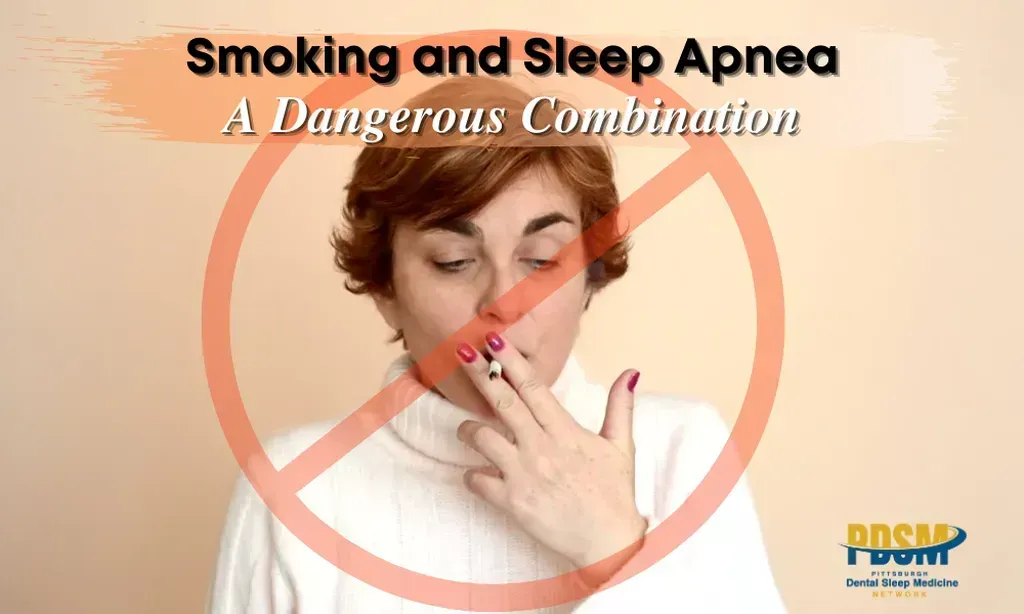Smoking and Sleep Apnea - A Dangerous Combination

It’s not new ‘news’ that smoking is bad for your health.
Smoking causes cancer, heart disease, stroke, lung diseases, diabetes, and chronic obstructive pulmonary disease (COPD), which includes emphysema and chronic bronchitis. Smoking also increases risk for tuberculosis, certain eye diseases, and problems of the immune system, including rheumatoid arthritis.
But did you know that smokers are also THREE TIMES more likely to have Obstructive Sleep Apnea (OSA) than are people who've never smoked? This happens because smoking can increase the amount of inflammation and fluid retention in the upper airway. It disrupts and alters your sleep cycles, can damage muscle function and inflame or increase mucus congestion in the upper airway.
At PITTSBURGH DENTAL SLEEP MEDICINE we are ready and able to successfully treat people with Obstructive Sleep Apnea through oral appliance therapy. OUR MAIN GOAL is to provide our patients with a variety of SOLUTIONS, but often times we also have to have conversations with our patients about quitting smoking, losing weight, reducing alcohol consumption, or other activities that can have a big effect on sleep apnea symptoms. Quitting smoking, or even just losing 10% of body weight may have the effect of eliminating the condition, so that is something that we would encourage.
When it comes to smoking, in addition to OSA and all of the other life-threatening health issues, it is also more likely to cause someone to develop a snoring problem that tends to be more frequent, louder and more severe than that of someone who doesn’t smoke.
Many people believe that if they have a cigarette before bedtime it will help them sleep better. But in all actuality, if you smoke before bed you may notice that you awaken frequently at night (maybe even to have another cigarette). This may be a clear sign that smoking is causing or worsening an existing breathing disorder that’s causing you to wake up. If you consider how smoking also leads to chronic breathing concerns and myriad diseases and health problems, it seems like the brief relaxation benefit of a quick puff at bedtime is definitely not be worth the risk.
Furthermore, it's important to consider that second-hand smoke can lead to these same problems with sleeping partners or even children in your home. Even if your smoking doesn’t seem to affect your health, it could still be quite detrimental to the health of those around you.
According to a study published in the International Journal of Pediatric Otorhinolaryngology, children aged 3 to 18 years with severe obstructive sleep apnea, who were exposed to secondhand smoke (SHS), had an increase in odds of obstructive apnea hypopnea index (OAHI) compared with children with no exposure to SHS,
Even if you are taking steps to treat your sleep apnea, your continued smoking habit is going to infringe upon those benefits, so it really behooves you to consider quitting if you want to overcome problems with OSA.
WE WANT TO HELP!
Quitting smoking is one of the hardest habits to break. PERIOD!! If you need help, consulting with both your primary care physician and a CERTIFIED SLEEP DENTIST at PITTSBURGH DENTAL SLEEP MEDICINE could be the ticket for successfully quitting and reclaiming not only good sleep, but good health. Here are some other helpful links and apps that are available to help you quit:
- Create a personalized quit plan to help guide you.
- Sign up for Smokefree TXT to get daily messages of tips, strategies, and support. Text QUIT to 47848.
- Download a Smokefree app. The quitSTART app can help you learn how to quit, manage cravings, and track your quit journey. Available for download on:
GooglePlay or the
AppStore.
- Visit Smokefree on social media. Stay connected and grow your support network.
- Talk to a quit coach. Call 1-800-QUIT-NOW (1-800-784-8669) to be connected to your state’s quitline. Trained counselors will provide you with tips and tools for quitting, and may be able to help you get free or reduced-cost nicotine replacement therapy medications. Or call the National Cancer Institute Quitline at
1-877-44U-QUIT (1-877-448-7848) Monday through Friday from 9:00 a.m. to 9:00 p.m for quitting help in English or Spanish.
- Chat with a quit smoking counselor. The National Cancer Institute’s
LiveHelp service is available Monday through Friday, 9:00 a.m. to 9:00 p.m. Eastern time. Also available in
Spanish.
- If you’re pregnant, visit Smokefree Women for tips on quitting while pregnant. Pregnant women are at higher risk for severe illness from COVID-19. And, you could have worse pregnancy outcomes, such as preterm birth, if you have COVID-19. During pregnancy, it is always important for you to try to protect yourself from illnesses whenever possible.
Call us at (724)935-6670 for a consultation and make 2021 your year to start on your path to a smoke-free way of living and better outcomes for the treatment of your Obstructive Sleep Apnea.
We wish you health, happiness, and prosperity in the new year!
https://smokefree.gov/
https://www.pulmonologyadvisor.com/
https://www.health.harvard.edu/
American Journal of Respiratory and Critical Care Medicine
American Lung Association
Journal of Clinical Sleep Medicine
Mayo Clinic

